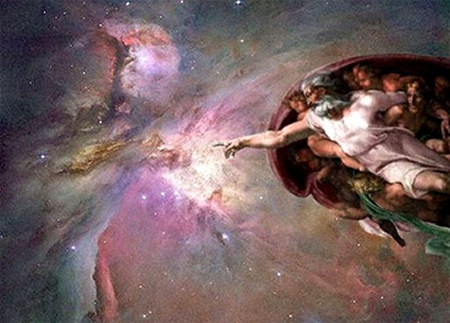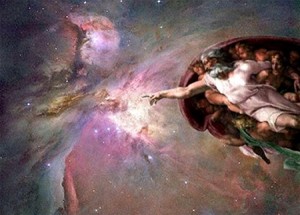Back at the beginning of the 21st century, PBS, the U.S. public broadcaster, ran a series called “Can Religion Withstand Technology?” For a large percentage of humanity who either believe in a god or gods the juxtaposition of a technological world and belief represents a real challenge. And although it appears we here in North America and Europe are getting less religious, (the United States being the exception), much of the rest of the world seems to be increasingly devout.
Why? Maybe it is uncertainty that drives so many of us in the 21st century to seek answers through our religious roots. And what is the cause of all this uncertainty? The relentless, accelerating change and innovation brought about by science and technology over the last fifty years has altered our world. We humans are influencing the planet in almost “godlike” fashion. For those seeking answers through god or gods change in our human relationship with life can be very disconcerting. As a result many seek fundamental truths as a way to cope with the increasing challenges caused by our scientific and technological revolution. It is a juxtaposition of yin and yang that we face here in the 21st century.
You see science and religion appear to be adversaries in establishing fundamental understanding of our existence. Where science uses hypotheses, observation and analysis to create its revelations, faith offers absolute belief in purpose and place directed by one or more supreme arbiters. I’ll give you an example.
I have been participating in an online four-year debate on a site called TakingITGlobal. The topic has been “Creationism, Evolution and Intelligent Design.” The moderator who started the discussion asked the question “Must the theories of Creationism, Evolution and Intelligent Design be opposed to each other?”
Confronted with this question many responders argue that religion and science are compatible. That a god or gods could be the mechanism for starting evolution. Some religious, however, discount evolution entirely. They point out that only a god or gods could be responsible for the complex world we live in. And of course there are those who point out that if the Universe is the creation of god or gods, then what created the creators. For those whose moral certainty is founded in religious doctrine the idea of matter rising from a primordial Big Bang and leading to us 13.2 billion years later is tough to swallow and as a result the conversation has gotten pretty heated at times.
The Developed World is the one most associated with the modern scientific and technological revolution. Modern science was born in Christian Europe where it butted heads with religious authority and yet still produced Galileo, Copernicus and Darwin to name just a few. And although science and technology had strong foundational roots in China, India and Southwest Asia, the scientific method that serves as the foundation of our technological advancement today seems to have been suborned to culture and religion in these other parts of the planet.
Despite that the products of the scientific and technological revolution have gone global. Today we have the Internet, mobile phone networks, social media, and modern medicine, the products of both hard and soft science pervasive everywhere on the planet. The fruits of this revolution have been extended lifespans for humans almost everywhere caused by an agricultural revolution that has reduced hunger and raised living standards across the planet, and the distribution of modern medical practices to alleviate disease and suffering. The consequences of the revolution include global warming, rising sea levels, an explosive growth in human population and FUD – fear, uncertainty and doubt about the future.
In the face of modern science and technology and its rapid impact on the world those who have certainty in belief must feel challenged by an uncertain future. Can their religious beliefs withstand the onslaught? Some on the other hand argue that the underlying drive to technology is in fact a way for humans to find god in his singular or plural manifestations.
In any case the fault lines that separate religion from science and technology are most apparent when the discussion turns to evolution versus creation, or in its modern wrapping, intelligent design. Both those who argue for evolution and those who argue for an intelligent omnipresence driving existence point to empirical evidence. The most noted by creationists is the complexity of the human eye. Evolutionists easily discount the arguments posed by creationists by pointing to the development of a wide range of eye types in other species, some more visually capable than ours, and to the fossil record showing how photoreceptor capability evolved from light sensitive single celled creatures, to primitive specialized light sensors in creatures like the flatworm, to compound eyes in insects, and so on.
In several future postings I will continue to explore this topic and look at how science and technology is playing its part among the major religions on the planet as the 21st century unfolds.


















Religion is about belief in propositions that are not demonstrated. Science is about belief in propositions that have been demonstrated, or at least are demonstrable in principle. The proposition of the “virgin birth” is not demonstrable. The two approaches are logically irreconcilable. The “true believer” thinks it sinful to subject his beliefs to rational criticism. He certainly refuses to do so himself, and is insulted if others do so. He will not read and honestly address the excellent points W. K. Clifford makes in his Victorian era essay, “Ethics of Belief.”
While I’m personally a theist, not a deist, I refuse religious discourse with all “believers” who cannot provide a rational reconciliation between the kinetic theory of gases and the workings of ordinary household refrigerators. That eliminates 99.99% of the “believers.” My second “no-discourse” filter is even more severe. Given that the “believer” supposes God created the cosmos and all its physical laws, does God have the power to realize his purposes working entirely within the physical laws? If he has that power, why would he cheat and use magic?
On the other hand, if he lacks that power, why would the believer insist that God is omnipotent? The only view that makes sense to me is that whatever it is that God does, he does within the laws of physics. I suppose the Creator of all the laws knows the laws better than anyone else, hence many lawful enterprises are possible to God, that are impossible to all those with deficient understanding of the laws.
I have no use for a “magic” God, and I refuse discourse with all that insist that they know God does magic. For several decades now, the “Amazing Randi” has offered his million dollars to anyone that can prove magic. Randi still has his million. When a true believer gets Randi’s million I might have to revise my no-discourse standards. I’m thinking the prospects of that are vanishingly small.
I love the idea of an XPrize for someone who can prove the existence of magic. I don’t describe myself as a theist. I am decidedly an atheist.
[…] https://www.21stcentech.com/religion-technology-science-21st-century/ […]